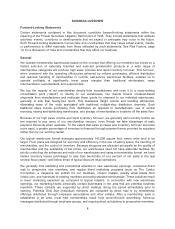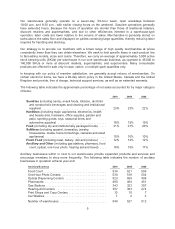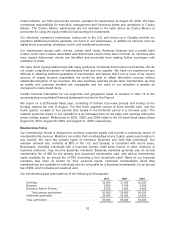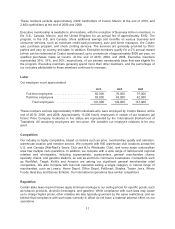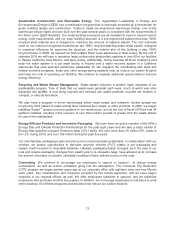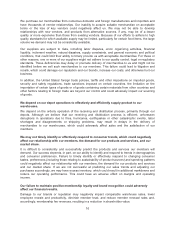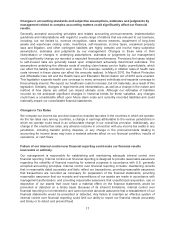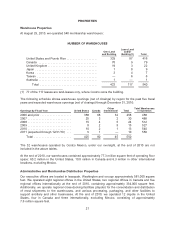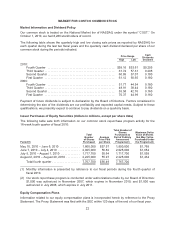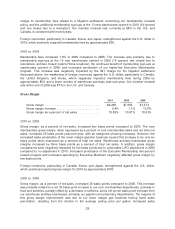Costco 2010 Annual Report Download - page 20
Download and view the complete annual report
Please find page 20 of the 2010 Costco annual report below. You can navigate through the pages in the report by either clicking on the pages listed below, or by using the keyword search tool below to find specific information within the annual report.Our international operations subject us to risks associated with the legislative, judicial,
accounting, regulatory, political and economic factors specific to the countries or regions in
which we operate, which could adversely affect our financial performance.
Our international operations are growing. Future operating results internationally could be negatively
affected by a variety of factors, many beyond our control and similar to those we face in the United
States. These factors include political conditions, economic conditions, regulatory constraints, currency
regulations and exchange rates, and other matters in any of the countries or regions in which we
operate, now or in the future. Other factors that may impact international operations include foreign
trade, monetary and fiscal policies both of the United States and of other countries, laws and
regulations of foreign governments and the United States (such as the Foreign Corrupt Practices Act),
agencies and similar organizations, and risks associated with having major facilities located in
countries which have been historically less stable than the United States. Risks inherent in
international operations also include, among others, the costs and difficulties of managing international
operations, adverse tax consequences and greater difficulty in enforcing intellectual property rights.
Additionally, foreign currency exchange rates and fluctuations may have an impact on our future costs
or on future cash flows from our international operations.
Market expectations for our financial performance is high.
We believe that the price of our stock generally reflects high market expectations for our future
operating results. Any failure to meet or delay in meeting these expectations, including our comparable
warehouse sales growth rates, margins, earnings and earnings per share or new warehouse openings,
could cause the market price of our stock to decline, as could changes in our dividend or stock
repurchase policies.
We rely extensively on computer systems to process transactions, summarize results and
manage our business. Disruptions in both our primary and back-up systems could harm our
business.
Although we believe that we have independent, redundant, and primary and secondary computer
systems, given the number of individual transactions we have each year, it is important that we
maintain uninterrupted operation of our business-critical computer systems. Our computer systems,
including our back-up systems, are subject to damage or interruption from power outages, computer
and telecommunications failures, computer viruses, internal or external security breaches, catastrophic
events such as fires, earthquakes, tornadoes and hurricanes, and errors by our employees. If our
computer systems and our back-up systems are damaged or cease to function properly, we may have
to make significant investments to fix or replace them, and we may suffer interruptions in our
operations in the interim. Any material interruption in our computer systems may have a material
adverse effect on our business or results of operations. The costs, potential problems, and
interruptions associated with implementing technology initiatives could disrupt or reduce the efficiency
of our operations in the short term. These initiatives might not provide the anticipated benefits or
provide them in a delayed or more costly manner.
Natural disasters or other catastrophic events could unfavorably affect our financial
performance.
Natural disasters, such as hurricanes or earthquakes, particularly in California or in Washington state,
where our centralized operating systems and administrative personnel are located, could unfavorably
affect our operations and financial performance. Such events could result in physical damage to one or
more of our properties, the temporary closure of one or more warehouses or depots, the temporary
lack of an adequate work force in a market, the temporary or long-term disruption in the supply of
products from some local and overseas suppliers, the temporary disruption in the transport of goods
18


